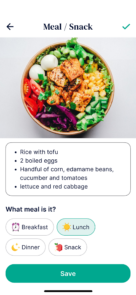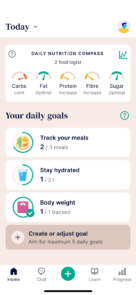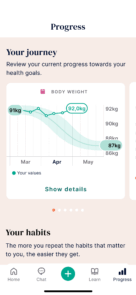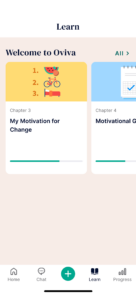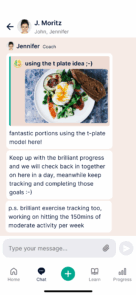
How much weight can you lose in a month?
It’s understandable to want to see results quickly when trying to lose weight. How much weight you can lose in a month is less about quick fixes and more about prioritising healthy progress. That way, you can keep your weight loss journey going beyond just month one.
If you’d like more support from our healthcare team on your weight loss journey, why not find out if you’re eligible for Oviva, an NHS-funded weight management programme?
Key Takeaways
- The NHS recommends an average weight loss of around 1-2 lbs (0.5-1 kg) per week, or 4-8 lbs (2-4 kg) in a month.
- It’s unsustainable to try and lose weight beyond these goals – it’s better to adopt a steady approach that can be continued over time.
- Factors can influence your monthly weight loss, like your starting weight and whether you have weight-sensitive health conditions, like PCOS.
- Oviva can help you adopt a sustainable weight loss strategy, combining diet, exercise, personal coaching, and weight loss medication for long-term results.
Setting realistic expectations for weight loss in a month
Setting a realistic weight loss target is vital for motivation and managing expectations. While you may want to see quick weight loss results, the lifestyle changes you would need to make are, likely, unsustainable and unhealthy.
A better approach if you want long-term results is to aim for steady, consistent weight loss.
This means rather than focusing on how many kg you can lose in a month, it’s better to set a sensible target for monthly weight loss and try to accomplish this month after month.
The sustainable approach is also better for motivation. People who aim for rapid weight loss often achieve good results initially but may soon hit a weight loss plateau. This can be demotivating, whereas steady progress can usually be maintained for much longer.

How much weight you can lose in a month (in a healthy way)
According to the NHS, the safe and recommended rate for weight loss per week is around 1 lb to 2 lbs, which is around 0.5 kg to 1 kg. Therefore, using these figures, the recommended rate of weight loss for most people is around 4 lbs to 8 lbs (2 kg to 4 kg) per month, and you can safely lose up to 10 lbs or around 5 kg in 5 weeks.
This recommendation should serve as a general guideline for healthy weight loss and can be a helpful goal, but this one-month weight loss rate may only be possible for some.
Weight loss beyond this rate is possible, especially in the first month or two, but it’s very challenging to sustain and can mean your body isn’t getting its basic nutritional needs.
It’s also important to know that rapid weight loss may include water and muscle mass loss. Retaining muscle mass when losing weight is key to staying healthy.
Factors that influence how much weight you can lose in a month
The amount of weight you can lose in a single month is influenced by various factors, including age, physical activity levels and any relevant health conditions you have.
Basal metabolic rate
Your basal metabolic rate (BMR) starts to decline as you get older, often beginning around the age of 60.
This decline can make it harder to lose body fat and you’re more likely to lose muscle mass after this age. This makes weight loss “quick fixes” even more risky as you age.
Physical activity
Higher physical activity levels can make it easier to lose and maintain target weight long term.
Be sure to combine cardiovascular exercise and strength training – strength training minimises muscle loss and improves your metabolism.
Medical conditions
Some medical conditions can impact your rate of weight loss.
Conditions like hyperthyroidism and polycystic ovary syndrome (PCOS) can make it more challenging to lose weight.
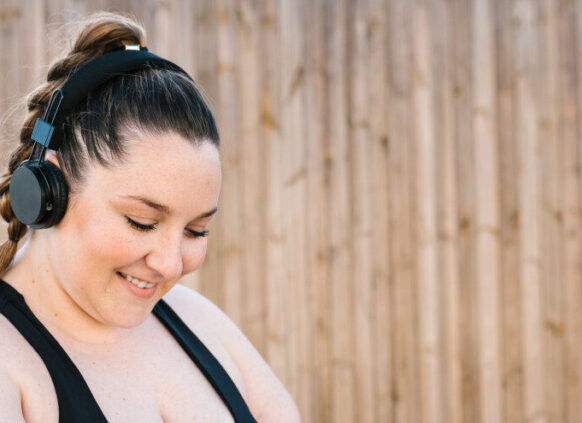
Starting weight
Your starting weight can impact your rate of weight loss, especially early on – a higher starting weight is generally linked to a higher initial weight loss rate.
People with more weight often lose it faster at first because their bodies burn more calories doing everyday activities.
Medication
The medication you take can have a significant bearing on your weight loss potential.
For instance, antidepressants can impact weight loss, while weight loss medication like Wegovy can significantly increase weight loss.
Your weight loss plan
Being part of medically-supervised plans like Total Diet Replacement (TDR) or very low calorie diets (VLCDs) may cause higher weight loss initially.
These diets involve extreme calorie restrictions, so it’s key that you’re supervised by healthcare professionals so that you don’t experience any health issues or side effects.

Why rapid weight loss is not always the best approach
There’s a temptation to achieve rapid weight loss through crash diets or “quick fixes”. However, studies show you’re more at risk of weight regain if you opt for rapid weight loss over gradual weight loss.
In fact, a 2017 study found that people lost more inches off their waist and hips with gradual weight loss.
Losing weight too quickly can also lead to significant muscle mass loss and nutritional deficiencies, especially if you’re following an ultra-low-calorie diet.
And eating too few calories can slow your metabolism, which can work against your weight loss goals in the long run.#
Generally, sustainable weight loss strategies will produce better results, especially in the long term, because these lifestyle changes are far easier to adjust to and stick with.
Practical tips for losing weight in a month
The following sections provide practical tips for weight loss in a month to maximise sustainable results.
Build healthy eating behaviours
Weight loss doesn’t need to come from uncomfortable restrictions, cutting out entire food groups or any of the other “quick fix” methods you’ve seen.
Instead, look at how you can build simple weight loss habits around the food you eat.
Some ideas to get you started:
- Reduce the amount of ultra-processed foods you’re eating by making easy switches like white bread and pasta to whole wheat, or sugary drinks to sparkling water.
- Try mindful eating on for size – instead of watching TV or scrolling on your phone during a meal, take your time to just sit and enjoy your food. You may find this helps you recognise when you’re full, too.
- Look at where you can switch to healthy snacks. For example, switch out your mid-morning biscuits for one or two dark chocolate rice crackers. Instead of a packet of crisps, how about baking a wholewheat pitta until crunchy and serving with hummus?
- If you’ve noticed a pattern of emotional or stress eating, keeping a journal of when it happens helps identify trends and triggers. For example, you may reach for unhealthy snacks after stressful work meetings. By journaling, you could identify that the trigger is workplace stress and instead plan a five-minute walk or sip a calming tea after meetings.
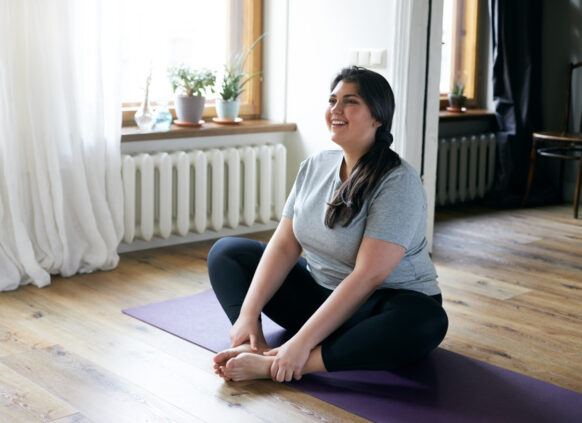
Increase your physical activity levels
Increasing your exercise can help maximise the amount of weight you lose in a month.
Be kind to yourself and where you’re at – it’s OK to start slowly and gradually build up. Remember – the key is sustainable change. For example, you could begin by going for a short walk every day.
When you feel ready, try to incorporate strength training as this helps to reduce muscle loss and can increase your metabolism.
The NHS recommends 150 minutes of moderate-intensity exercise per week, such as brisk walking, cycling, hiking, or mowing the lawn.
Alternatively, you can aim for 75 minutes of vigorous exercise, such as running, swimming, or walking up and down the stairs.
Focus on sustainable changes
Rather than pushing for the most weight loss in a month, focus on sustainable changes that are more about setting good habits than hitting a number on a scale.
For diet and exercise, this could look like:
“I will prepare home-cooked meals four nights a week for the next month that take no more than 30 minutes to make.”
“I will walk for 30 minutes, four days a week, for the next month to increase my daily activity level.”
These aren’t directly about weight loss, but by building these habits into your routine, you’re creating a lifestyle centred around healthy weight management.
Set goals and track your progress
Setting realistic goals and tracking your weight loss progress helps you stay motivated, know what you’re working towards and celebrate all the wins along the way.
It also keeps a check on whether your current approach is working.
And don’t just set goals for the number on the scales, but set inspiring lifestyle goals you can look forward to like:
- Reducing your blood pressure and cholesterol
- Feeling more energised
- Getting stronger in your body
- Improving your cooking skills
We’re big advocates of goal-setting and tracking your progress and we think the best weight loss apps should include both features. That’s why we made sure that the Oviva app offers both.

I enjoyed speaking with my dietician via the Oviva app as I could fit it into my schedule.
Professional support and medication
If you’re struggling to manage your weight alone, you might find professional support helpful. In the UK, weight management services are organised into tiers (from Tier 1 to Tier 4).
If you have a BMI of 35+, you could be eligible for Tier 3 weight management.
Tier 3 can be incredible if you’ve tried a lot of weight loss methods and haven’t seen results. That’s because it brings together a team of experts – like dietitians, psychologists and doctors – who work together to help you with all aspects of weight loss, from creating a personalised eating plan to tackling emotional eating or managing any medical conditions linked to your weight. It may also include access to prescription weight loss medication like Wegovy.
You don’t need to join an NHS waiting list to be part of a service like this – Oviva provides NHS-funded Tier 3 weight management through a free and easy app.
We’ve helped over 1,000,000 people across Europe lose an average of 13.6kg in 12 months, all with the remote support of the Oviva app.
Oviva patient success stories:
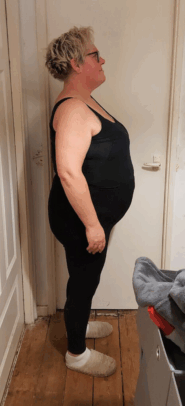
 -22kg
-22kg
Heidi (53)

 -25kg
-25kg
Martin (34)

 -32kg
-32kg
Patricia (53)

How Oviva supports healthy weight loss
Accredited by the NHS and recommended by NICE, Oviva is a weight management programme emphasising personal care. We help individuals through a tailored approach to weight loss, focused on areas like healthy eating, exercise and emotional support.
Through the Oviva mobile app, you’ll have direct communication with a real coach, and you can benefit from expert advice and options to track your meals, mood and exercise. Oviva can also provide access to prescription weight loss injections, like Wegovy.

